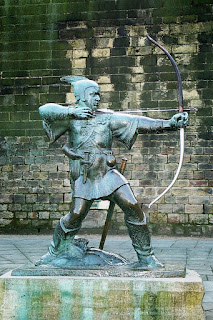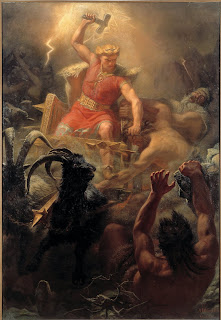Reading Notes Week 12: Ballads of Robin Hood, Part A (EC)
Robin Hood Statue (Wikimedia)
Reading Notes Week 12: Ballads of Robin Hood, Part A
Progress to Nottingham:
· Interesting how the story changes a bit when presented as a ballad: less reliance on typical plot drivers like dialogue or action and more use of song elements like “Hey Down derry derry down” to keep the story moving along.
· Interesting feeling evoked by colloquialisms that at once seem familiar and anachronistic.
· Repetition here is interesting as it is the trait of Literary Narrative “Patterned Repetition” in the most explicit sense, though I’m not sure what effect it has.
· This tale went from sing songy and almost Disney esque and then very quickly changed course as Robin Hood just drops all of foresters on the spot with his bow.
· The story is even sing songy when discussing how they buried the men Robin Hood killed
Little John:
· Much like the arguing in Shakespearean pieces, this kind of dialogue always makes me laugh. The way that old English characters insult each other is hilarious, and it’s interesting to make comparisons to how people would argue today. Might be a good retelling opportunity to modernize this story.
· “Thou dost prate like an ass,” is definitely in consideration for one of the best lines in an argument of all time.
· Interesting set of rules and customs for Robin hood and his men. I am curious as to the nature of organization of this group and whether that kind of structure was something that was common knowledge in the times this would have been popular. I think this might be the case because it never explains the group, almost assuming the reader already understand how Robin Hood’s group would be setup.
· What these group of guys like to do, says a lot about a certain aspect of life at this time. While this is certainly not reflective of what this culture values in the sense of religion or likewise, but it does offer a glimpse at the values of certain groups. Robin Hood seems to be a working class/lower class hero rather than a hero from the church or bourgeois.




Comments
Post a Comment